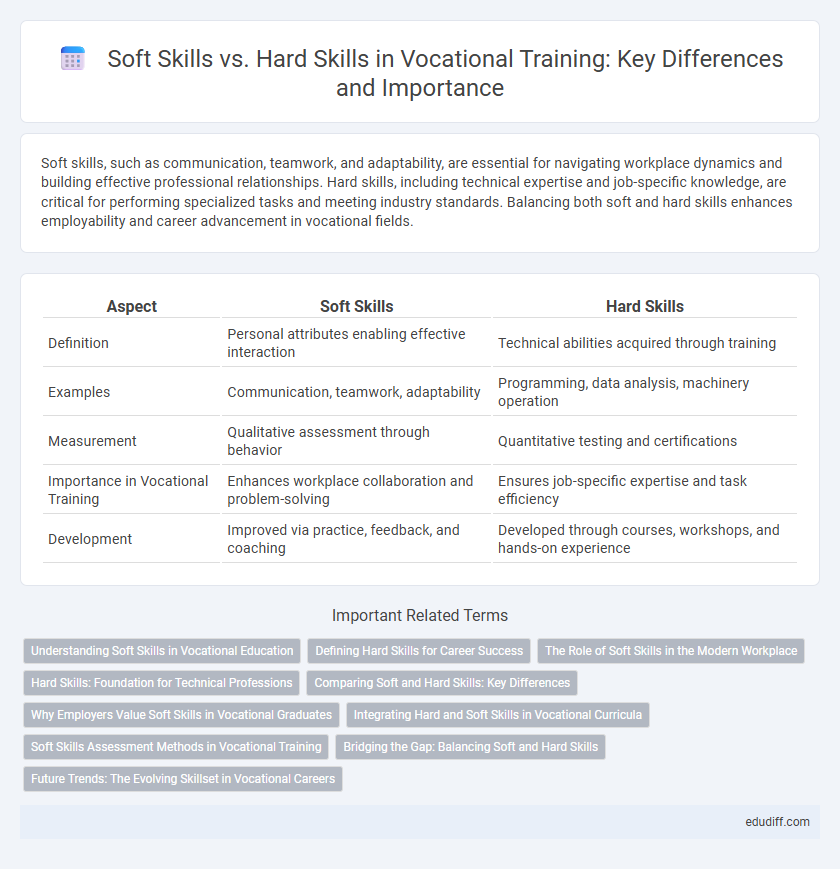Soft skills, such as communication, teamwork, and adaptability, are essential for navigating workplace dynamics and building effective professional relationships. Hard skills, including technical expertise and job-specific knowledge, are critical for performing specialized tasks and meeting industry standards. Balancing both soft and hard skills enhances employability and career advancement in vocational fields.
Table of Comparison
| Aspect | Soft Skills | Hard Skills |
|---|---|---|
| Definition | Personal attributes enabling effective interaction | Technical abilities acquired through training |
| Examples | Communication, teamwork, adaptability | Programming, data analysis, machinery operation |
| Measurement | Qualitative assessment through behavior | Quantitative testing and certifications |
| Importance in Vocational Training | Enhances workplace collaboration and problem-solving | Ensures job-specific expertise and task efficiency |
| Development | Improved via practice, feedback, and coaching | Developed through courses, workshops, and hands-on experience |
Understanding Soft Skills in Vocational Education
Understanding soft skills in vocational education enhances communication, teamwork, and problem-solving abilities essential for workplace success. These interpersonal skills complement hard skills by fostering adaptability and emotional intelligence, critical for dynamic job environments. Vocational programs integrating soft skills training improve employability and career advancement opportunities.
Defining Hard Skills for Career Success
Hard skills are specific, teachable abilities essential for vocational success, such as technical proficiency, data analysis, and equipment operation. Mastery of these measurable competencies directly impacts job performance and career advancement within industries like manufacturing, IT, and healthcare. Employers prioritize hard skills during recruitment to ensure candidates possess the practical expertise required for specialized roles.
The Role of Soft Skills in the Modern Workplace
Soft skills such as communication, teamwork, and emotional intelligence are essential for adapting to dynamic work environments and fostering collaboration in the modern workplace. Employers increasingly prioritize these interpersonal abilities alongside technical hard skills like coding or data analysis to enhance productivity and innovation. Mastery of soft skills directly influences leadership effectiveness, customer relations, and conflict resolution, making them crucial for career advancement in vocational settings.
Hard Skills: Foundation for Technical Professions
Hard skills are essential technical abilities and knowledge required to perform specific tasks in vocational professions, such as coding, machinery operation, or electrical wiring. Mastery of these skills ensures accuracy, efficiency, and safety in highly specialized fields like engineering, healthcare, and information technology. Employers prioritize candidates with strong hard skills because they directly impact productivity and quality outcomes in technical roles.
Comparing Soft and Hard Skills: Key Differences
Soft skills encompass interpersonal abilities like communication, teamwork, and adaptability, enabling effective collaboration and problem-solving in the workplace. Hard skills refer to technical expertise and job-specific knowledge, such as coding, machinery operation, or data analysis, which are measurable and teachable. Understanding the distinction between soft and hard skills helps employers balance candidate qualifications for optimal job performance and career development.
Why Employers Value Soft Skills in Vocational Graduates
Employers value soft skills in vocational graduates because these abilities, such as communication, teamwork, and problem-solving, directly impact workplace productivity and collaboration. While hard skills provide technical expertise, soft skills enable graduates to adapt, manage conflicts, and engage effectively with clients and colleagues. This combination enhances overall performance and drives business success in dynamic vocational environments.
Integrating Hard and Soft Skills in Vocational Curricula
Integrating hard and soft skills in vocational curricula enhances learner employability by combining technical proficiency with communication, teamwork, and problem-solving abilities. Vocational programs that balance hands-on training with interpersonal skills development better prepare students for dynamic workplace environments and promote adaptability. Emphasizing collaboration between industry stakeholders and educational institutions ensures curricula remain relevant and aligned with evolving labor market demands.
Soft Skills Assessment Methods in Vocational Training
Soft skills assessment methods in vocational training emphasize practical evaluations such as role-playing scenarios, peer feedback, and self-assessment tools to measure communication, teamwork, and problem-solving abilities effectively. These methods integrate real-world contexts to enhance learners' interpersonal and adaptability competencies critical for workplace success. Incorporating digital platforms and psychometric tests further refines the accuracy of soft skills evaluation in vocational education programs.
Bridging the Gap: Balancing Soft and Hard Skills
Bridging the gap between soft skills and hard skills is essential for vocational success, as employers seek candidates who demonstrate technical proficiency alongside interpersonal abilities such as communication, teamwork, and problem-solving. Effective training programs integrate practical hard skills like machinery operation or coding with soft skills development, enabling workers to adapt to dynamic work environments and collaborate efficiently. This balanced skill set enhances employability, productivity, and career growth in trades, manufacturing, and service industries.
Future Trends: The Evolving Skillset in Vocational Careers
The evolving vocational landscape highlights a rising demand for a balanced integration of soft skills like adaptability, communication, and emotional intelligence alongside technical hard skills such as data analysis and digital literacy. Automation and AI advancements drive the necessity for workers to continuously upskill, emphasizing problem-solving and critical thinking to complement technical expertise. Future vocational careers will prioritize hybrid skill capabilities that enable effective collaboration, innovation, and resilience in fast-changing industries.
Soft Skills vs Hard Skills Infographic

 edudiff.com
edudiff.com